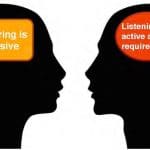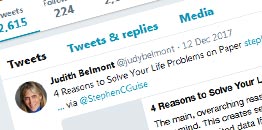Original article on pro.psychcentral.com.
 One of the most valuable lessons that my clients have found useful over the years is learning the art of active listening.
One of the most valuable lessons that my clients have found useful over the years is learning the art of active listening.
All too often, when people think of being a good communicator, they think of having good verbal skills. However, much of healthy communication is knowing how to listen … and not just hear!
The first step to being an effective listener is to realize that hearing is not the same thing as listening! Watch out for being so focused on what you say that you end up hearing instead of listening!
What is the difference?
Hearing is merely taking in audible sounds. It is passive, and requires no effort other than hearing what is being said on the surface. Hearing provides little feedback to others, and lacks collaboration, empathy and does not promote closeness.
On the other hand, listening requires more effort as you interpret messages on both non-verbal and verbal levels. In active listening, you decipher actively the message being expressed by the other person, including acknowledging the other person’s feelings. In active listening, you reflect what is heard in a nonjudgmental fashion. That entails validating and empathizing with the other person, instead of trying to force your own point.
Did you ever notice that in the midst of an argument, people talk at each other and not with each other? When you talk at each other, you are hearing. When you talk with each other, you are listening.
Those who merely hear instead of listen will be more likely to argue and defend themselves. Just think of how many altercations and misunderstandings people could avoid by using good listening skills!
Here are some tips for effective listening
LISTEN FOR THE MESSAGE BEHIND THE WORDS—Hook into the other person’s feelings, concerns, questions, joys, and fears, and verbalize your impressions back to them. “It sounds like you are really disappointed in how it turned out.”
SHOW THAT YOU CARE—Focus on the other person, not yourself; show concern through body language and attentiveness. “Is there anything I can do to help you feel better?”
VALIDATE INSTEAD OF JUDGING – Never try to change another person’s thoughts or feelings! Validate their feelings since it is not for you to judge how they “should” think and feel! “I did not mean to hurt you or be critical, so am glad you let me know how you were hurt by my words.”
CLARIFY – DON’T INTERROGATE —Do not demand reasons or justifications when you clarify. Summarize what is said in a nonjudgmental fashion. “ So, to be clear, are you telling me that you do not want to make plans with them again?
SHOW EMPATHY – Respect and accept the feelings of others – without minimizing or focusing on why they should not feel a certain way. Instead of judging that someone is too sensitive, you can say “ It must have been hard for you to open up to me about that. That took a lot of courage.”
For more tips, click here to learn to use statements that help others express themselves.
How about you – are you a good listener or do you tend only to hear?
Think of the last time you had a disagreement with someone. Did you listen or did you just hear? As an active listener, you will give others the gift of nonjudgmental acceptance and empathy. Those are core skills in developing healthy, respectful relationships both personally and professionally.



